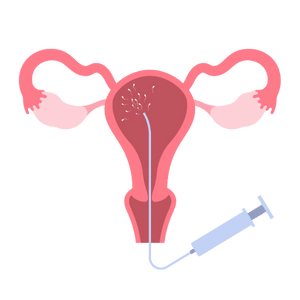
23 Oct The Complete Guide to Intrauterine Insemination (IUI)
For many couples struggling with infertility, Intrauterine Insemination (IUI) can be a ray of hope on their journey to parenthood. IUI, a relatively simple and minimally invasive fertility treatment, has helped countless couples achieve their dream of having a child. In this comprehensive blog, we will delve into the details of the IUI process, from its basics to its success rates and potential risks. Whether you’re considering IUI or just want to learn more about it, this guide will provide you with all the essential information you need.
• Understanding IUI
What is IUI?
Intrauterine Insemination (IUI) is a fertility treatment in which sperm is directly placed inside a woman’s uterus to facilitate fertilization. This procedure helps to increase the chances of sperm reaching and fertilizing an egg, thus enhancing the chances of conception.
When is IUI recommended?
IUI is often recommended in the following situations:
Unexplained infertility: IUI is a viable option when a couple’s infertility remains unexplained after initial evaluations.
Male infertility issues: IUI can help when the male partner has mild sperm-related problems, increasing the chances of successful fertilization.
Cervical factor infertility: IUI bypasses cervical mucus issues, enabling sperm to reach the uterus more easily.
Donor sperm insemination: IUI is commonly used for couples where the male partner’s sperm is not available, using donor sperm for insemination.
Mild endometriosis: IUI may be recommended for women with mild endometriosis to enhance their chances of conception.
Couples with a known sperm donor: In cases of known sperm donors, IUI is a controlled and effective method for achieving pregnancy.
Who can benefit from IUI?
Couples experiencing the above-mentioned situations can benefit from IUI. It is a less invasive and more affordable alternative to In Vitro Fertilization (IVF), making it a popular choice for many couples.
• Preparing for IUI
Initial Consultation
Before beginning IUI, you will have a consultation with a fertility specialist who will evaluate your medical history and recommend any necessary tests. These may include blood tests, ultrasounds, and semen analysis.
Ovulation Monitoring
Precise timing is crucial in IUI. Ovulation is monitored using ultrasounds and hormone level tests to determine the optimal time for the procedure.
Semen Collection and Preparation
Semen is collected, processed, and prepared in the lab. This process concentrates the healthiest sperm, which are then used for insemination.
Timing
The IUI procedure is scheduled when the woman is about to ovulate. This is often determined by monitoring the development of follicles on the ovaries.
Veramed Fertility and IVF, located in Shalimar Bagh, New Delhi, provides the best IUI and IVF treatment services in Delhi. If you’re experiencing fertility challenges, you can easily schedule your appointment online with infertility specialist Dr. Deepika Jagga.
• The IUI Procedure

Insemination Process
During the IUI procedure, a catheter is used to insert the prepared sperm directly into the uterus. It’s a relatively painless process and typically takes only a few minutes.
Potential Discomfort
Some women may experience mild discomfort, similar to menstrual cramps, during or after the procedure. However, it is generally well-tolerated.
Rest and Recovery
After the procedure, patients are usually advised to rest for a short period before resuming their daily activities.
• Success Rates
Factors Affecting Success
Success rates for IUI vary, with factors such as the woman’s age, the cause of infertility, and the quality of sperm playing a significant role. Generally, younger women with unexplained infertility tend to have higher success rates.
Realistic Expectations
It’s important to set realistic expectations. IUI may not work for everyone, and multiple cycles may be necessary to achieve a pregnancy. If IUI is not successful, other fertility treatments like IVF may be considered.
• Possible Complications
Risk Factors
While IUI is considered safe, there is a small risk of infection, discomfort, or multiple pregnancies (due to the stimulation of the ovaries). Careful monitoring and experienced healthcare providers can minimize these risks.
Managing Complications
In the event of complications, your fertility specialist will provide guidance on how to manage them and address any concerns.
• After IUI
The Two-Week Wait
After the procedure, there is a waiting period of approximately two weeks before taking a pregnancy test. This period can be emotionally challenging, as couples anxiously await the results.
Pregnancy Test
A pregnancy test is usually performed approximately two weeks after the IUI. If the test is positive, congratulations! If not, your fertility specialist will discuss the next steps.
• Conclusion
Intrauterine Insemination (IUI) offers hope for couples struggling with infertility. Understanding the process, its preparation, and what to expect can help make the journey more manageable. While success rates vary, IUI can be an effective, minimally invasive option on the path to parenthood. Remember to consult with a fertility specialist who can provide personalized guidance and support throughout the process. Your journey may have its ups and downs, but with determination, a supportive network, and the right medical care, IUI can be a crucial step towards realizing your dream of becoming parents.
Book your appointment now with the best infertility specialist in Delhi.

Sorry, the comment form is closed at this time.